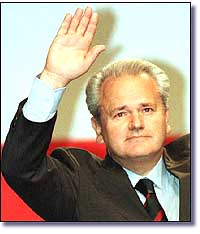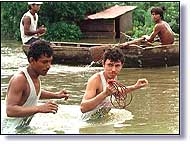By Charles J. Hanley, Associated Press, 12/29/98
 Serbian President Milosevic
Serbian President Milosevic
Serbia
went on the attack against Albanian separatist
guerrillas in that Serbian province, filling the
forests and hillsides with cowering refugees.
|
In the drowned villages of China and Central America, along the stormy coasts of California and Peru, man met nature in 1998 and came out a loser. It was, by one reckoning, the costliest year on record for weather disasters.
But when it came to man vs. man in 1998, in the contest between war and peace, right and wrong, mankind sometimes, in small ways, looked like a winner.
That was the look on Good Friday in Belfast, when a new beginning was found for Northern Ireland. It was the look one midsummer midnight in Rome, when weary negotiators put the last touches to a new global court for war crimes. And it was the look after an October all-nighter beside Chesapeake Bay, where Israeli and Palestinian nudged each other a few more steps down the road to peace.
"There has been enough destruction, enough death, enough waste,'' Jordan's King Hussein said that day. "... We are moving in the right direction.''
The right direction - in small ways, in some places. But in many others in 1998, there seemed no limit to death and destruction.
 Hurricane Mitch
Hurricane Mitch
Mitch meandered through the Caribbean and finally settled over the
Honduran coast, to sit and torment the people of Central America with an
unimaginable scourge of rain.
|
One Friday in August, twin bombs struck at soft spots in America's anti-terrorist armor, devastating U.S. embassies in Kenya and Tanzania, killing 224 people.
Washington retaliated with cruise missiles against suspected terrorist targets in Afghanistan and Sudan, and posted a $5 million reward for the alleged mastermind of the embassy bombings, Saudi exile Osama bin Laden.
Four months later, in December, the United States unleashed its missiles again, this time in a four-day air campaign against Saddam Hussein's Iraq.
In the Balkans, in the eighth year of a bloody decade, it was Kosovo's turn to bleed. Serbia went on the attack against Albanian separatist guerrillas in that Serbian province, filling the forests and hillsides with cowering refugees.
And in other sorrowful corners of the world, from Algeria to Burundi to long-suffering Sri Lanka, the strife of religion or "tribe'' tilted the balance once more, in 1998, against peace.
Death came, too, from man's failures in another arena, mastering his own technology. Ninety-six people were killed in the crash of Germany's fastest train, and 229 perished in the looping, horrifying and unexplained plunge of a Swissair jetliner into the chill sea off Nova Scotia.
The Year of the Tiger was to have been a year of "optimism and energy.'' But the forecast that mattered in 1998 came not from the Chinese zodiac, but from the weatherman.
From the year's first days, severe storms spawned by the El Nino phenomenon raked the eastern Pacific rim. In California, houses slid down muddy hillsides and crops were total losses.
Peru was hardest hit. Floods and mudslides drove hundreds of thousands of Peruvians from their homes and washed away vast swaths of farmland. "I'm waiting for the earth to open up and swallow Peru. It's the only thing that hasn't happened,'' said one farmer.
Nature then shifted its fury to China.
Armies of sandbaggers could not hold back the Yangtze and other flooded rivers as they inflicted catastrophic damage through the summer: More than 5.6 million houses were destroyed and almost 64 million acres of land swamped, an area the size of Italy. More than 3,600 people were reported killed.
A deadlier event was still to come, halfway around the world, where a hurricane dubbed Mitch meandered through the Caribbean and finally settled over the Honduran coast, to sit and torment the people of Central America with an unimaginable scourge of rain - up to 25 inches (62.5 centimeters) a day.
Swollen brown torrents flooded towns. Collapsing hillsides engulfed villages. Bridges and highways vanished, and national economies dissolved in the muddy runoff. More than 9,000 people died.
"In two days, we went backwards 50 years,'' lamented the Honduran archbishop.
Even in Bangladesh, homeland of misfortune, 1998 was extraordinary: Flooded rivers displaced one-quarter of its 124 million people. In India, a cyclone and tidal wave swept away up to 14,000 people, many of them destitute salt workers who lived - and died - beside the Arabian Sea.
Weather-related disasters in 1998 caused at least $89 billion in economic losses worldwide, the Washington-based Worldwatch Institute estimated. It was the most, by far, in two decades of record-keeping.
While weather afflicted the masses, climate troubled their leaders.
Envoys from 160 nations, aware of projections that 1998 would be the planet's warmest year on record, met in Argentina and took further small steps toward carrying out a year-old accord to combat global warming.
In other meetings in other conference halls, some of the century's "intractable'' problems grudgingly gave ground.
A negotiating marathon in Belfast produced "a bloody miracle,'' in one participant's words, a deal to end decades of violence by giving the Irish Republic a voice in governing Northern Ireland. In Maryland, the bay-side Middle East talks, brokered by President Clinton, led to new Israeli withdrawals from Palestinian land.
But U.S. efforts elsewhere proved less satisfying. American brinkmanship did force Iraq to back off, twice, in confrontations over U.N. weapons inspections, and Serbia to pull back troops from Kosovo. But both challenges seemed sure to flare anew in 1999.
And Washington stood by helplessly while the cap came off the nuclear bottle, as first India, then Pakistan exploded test bombs at secret desert sites, defying the U.S.-led nonproliferation regime.
In other ways, however, 1998 was a year for cooperation - for building, brick by brick, structures for the next century.
In the U.S. Senate and elsewhere, NATO parliaments began giving final approval to opening the alliance to Eastern Europe in 1999. The European Union cleared the way for its new continental currency, the euro, in the new year. And global powers teamed up, through billions in new loans, to contain an economic crisis that had impoverished millions, almost overnight, in East Asia and Russia.
In Rome, the newly negotiated war crimes court was born with a defect: The United States, wary of putting its soldiers under the court's jurisdiction, refused to sign on. Kofi Annan, U.N. secretary-general, hailed it nonetheless as a "giant step forward.''
For the human rights movement, the year was topped off with the unexpected. A Spanish warrant alleging genocide and terrorism snared the aged ex-dictator of Chile, Gen. Augusto Pinochet, as he visited London. Depending on its outcome, the case could turn this century's "untouchables'' into wanted men in the next.
More of those untouchables fell in 1998, including one of the most durable authoritarians, Indonesia's President Suharto, who stepped down under the relentless pressure of economic collapse and bloody rioting.
"We don't know if this means democracy or freedom, but it means change,'' said one happy Indonesian. "And change is good.''
The right direction - in small ways, in some places. Even, at times, in the age-old contest of man and nature.
Some such steps were quiet - when scientists, for example, finally unlocked the genetic secrets of tuberculosis, one of the great human killers.
And some were noisier - like the blastoff of the first pieces of the International Space Station, a 16-nation research platform that should help define the coming age, and from whose lofty perch, vintage 1998, man may someday look down and reflect: That had to be a winning year.


